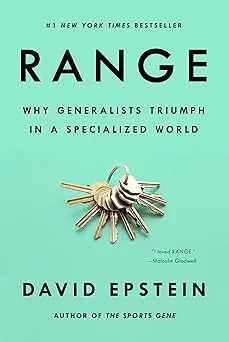About this book
Five Key Takeaways
- Generalists thrive by leveraging diverse experiences for adaptability.
- Broad skill development enhances creativity and innovation.
- Embracing challenges fosters deeper understanding and learning.
- Analogical thinking connects insights across various fields.
- Exploration and flexibility lead to personal and professional growth.
-
Generalists Thrive in Complexity
Research shows that generalists often outperform specialists in complex environments. This stems from their ability to connect ideas across fields (Chapter 1).
Generalists adapt better because their varied backgrounds allow them to approach problems holistically, considering multiple perspectives rather than narrow ones.
In today’s fast-changing world, this flexibility equips them to tackle challenges where specialized knowledge may fall short.
Studies demonstrate that generalists excel in innovation and creativity, as their diverse experiences foster unique insights (Chapter 3).
This trend is significant in industries undergoing rapid evolution, as generalists' adaptability stands as a key competitive advantage.
As a result, success is increasingly linked to broad knowledge rather than deep but narrow expertise.
This finding reminds us that mastering multiple domains can make individuals more resilient and valuable in dynamic contexts.
Ultimately, the ability to draw connections between seemingly unrelated areas defines the edge generalists bring in solving complex problems.
-
Switching Careers May Unlock Potential
Many believe switching fields wastes time, but this mindset ignores the hidden benefits of exploring new paths.
Rigid specialization can lead people away from their true passions or strengths, stifling personal and professional growth.
Changing careers fosters self-discovery. It allows individuals to uncover roles where their interests and abilities align better.
While not immediately intuitive, shifting direction can make individuals more adaptable and capable of navigating life’s uncertainties.
The author posits that late bloomers and career switchers redefine success, emphasizing exploration over rigid adherence to early decisions.
Historical examples, like Van Gogh and J.K. Rowling, showcase how stepping into new fields can yield unexpected brilliance and impact.
This perspective highlights the importance of embracing varied experiences to find a career that truly resonates.
Staying open to change fosters growth and aligns people with paths that bring greater satisfaction and opportunity.
-
Prioritize Diverse Learning Experiences
In education and personal development, focusing narrowly makes it harder to adapt to a complex, unpredictable world.
Instead, expose yourself to varied activities, studies, or hobbies that span multiple disciplines or skillsets.
Use this exploration phase to discover your strengths and interests before specializing too soon in a single area.
This approach enhances cognitive flexibility, which is critical for problem-solving and adapting to new challenges in work and life.
By building broad competencies, you gain a unique ability to make connections others might overlook, fostering creativity and innovation.
Incorporating diverse learning habits ensures well-roundedness, making you more resilient to shifts in technology or industry demands.
Ultimately, breadth in experience provides a toolkit for success in evolving, complex challenges where deep specialization falls short.
-
Desirable Difficulties Reinforce Learning
Struggling with challenges during learning, termed "desirable difficulties," leads to deeper retention and better knowledge application (Chapter 4).
Quick and easy learning paths might feel rewarding immediately, but they fail to build the durable understanding required for long-term success.
When learners actively work to solve problems, even with uncertainty, they strengthen critical cognitive connections.
Research shows that strategies like interleaved practice and attempting answers independently enhance flexible thinking and adaptability (Chapter 4).
These methods also ensure that learners can apply their knowledge across different, sometimes unexpected, contexts.
This principle emphasizes the importance of embracing struggle as an integral part of the learning process.
Ultimately, it encourages educators and learners to prioritize depth and flexibility over immediate, shallow outcomes.
By weaving challenges into education, we create a strong foundation for success in real-world problem-solving.
-
Analogical Thinking Drives Innovation
Modern problem-solving often relies overly on specialization, neglecting the power of analogical thinking across fields.
This narrow focus limits creativity, as specialists can become trapped in conventional paradigms, missing outside-the-box solutions.
The author argues that drawing analogies from diverse domains fosters creative breakthroughs and uncovers fresh insights.
For instance, diverse teams that harness varied analogies tend to outperform those confined to specialized expertise (Chapter 5).
By unlocking distant connections, individuals challenge established norms, opening pathways to new innovations and opportunities.
The value of analogical reasoning lies in its ability to reframe problems, finding answers hidden from conventional approaches.
The author supports promoting interdisciplinary studies and broad exposure to cultivate this critical skillset for modern challenges.
Embracing analogical thinking prepares us to innovate and tackle problems otherwise deemed unsolvable by specialists alone.
-
Embrace Experimentation and Playfulness
Strictly structured problem-solving methods limit creativity. Experimenting freely often leads to groundbreaking ideas and unearths hidden connections.
Allow yourself to wander intellectually. Engage in seemingly unrelated activities or methods to spark new perspectives.
Apply curiosity-driven exploration in both work and hobbies to uncover unexpected ideas and possibilities.
By stepping away from rigid approaches, you enable yourself to connect dots that might otherwise remain fragmented.
This playful experimentation fosters multidisciplinary breakthroughs, distinguishing innovators from those constrained by specialization.
Adopting this mindset makes individuals more adept at approaching challenges creatively, often with significant, unexpected results.
Diversifying your methods ensures a greater chance of discovering inventive, unique, and impactful solutions.
-
Outsiders Often Solve Complex Problems
Research shows that outsiders frequently solve problems that stump specialists, thanks to their broader, cross-disciplinary perspectives (Chapter 6).
This occurs because outsiders approach challenges free from rigid methods and bring fresh insights from unrelated experiences.
Organizations like InnoCentive highlight this principle, proving that diverse problem-solvers often crack seemingly unsolvable issues.
Specialists, while highly skilled, risk becoming too entrenched in their fields, relying on limited frameworks.
Conversely, outsiders leverage unique viewpoints and analogies, reshaping the way solutions are discovered and implemented (Chapter 6).
This finding underscores the need to open industries to interdisciplinary collaboration and harness the creative power of diversity.
Breaking out of narrow expertise doesn’t just enhance problem-solving—it drives innovation across industries and fields.
Ultimately, fostering a culture of inclusion and idea-sharing can address challenges in ways that specialization cannot.




















